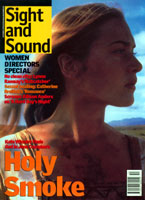Primary navigation

UK 1998
Reviewed by Nick Thomas
Our synopses give away the plot in full, including surprise twists.
Outside Kings Cross station in London, rent boy Simon picks up a punter, who is then beaten and robbed by Simon's mates, Mick, Tony, Wivva, Fish and Stu. They return to their favourite café to count their loot. The gang have in common a history of sexual abuse, and see themselves as avengers, out to get even with their exploiters. After beating up another john in a urinal, they seek out and attack Merriman, Tony's former foster father. Unlike the other members of the gang, Stu works as a trainee for the kind-hearted Chef and his wife Beryl, and is trying to build a relationship with waitress Kathleen. Chef's sudden illness prompts Stu to find his own sister Jen, who was also a victim of their abusive father, and his collaborator Trewin, a wealthy pimp who procures boys. Stu and the gang go to Trewin's house in search of material to blackmail Trewin with. But when Trewin takes Jen's daughter Kirsty hostage to recover the evidence, Stu's concern is for her welfare. When the handover is botched, Fish attempts to climb onto Trewin's moving vehicle and is killed when it crashes. Stu agrees to a reunion with his father, now implicated along with Trewin, but beats him savagely before urinating on him. The friends bury Fish at sea.
The screenplay of A Kind of Hush is based on Richard Johnson's autobiographical novel Getting Even, a title which perhaps better reflects the film's potential pleasures. But indebtedness to a real-life account of the sexually abused taking late and indiscriminate revenge prevents the narrative from engineering the kind of dramatic pay-off that makes the finale Tod Browning's Freaks (1932), for example, so thrilling. Our heroes' brand of vigilante 'justice' is meted out inconsistently - hapless punters are dealt with as viciously as serial abusers. That may be an accurate depiction of victims' anger, but it tends to dissipate sympathy and deflect the narrative revenge arc the film appears to be taking.
Writer-director Stirner coaxes notable performances from a team of virtual unknowns. Making his debut behind the camera after a career as a stage director and as an actor in theatre and film (notably in Overlord), Stirner has used improvisational exercises to create a credible bond between the young performers. Harley Smith as Stu is impressive in his attempts to come to terms with his past and to forge a 'normal' future for himself. There are strong performances also from Paul Williams as the aggressive Mick; Nathan Constance as the young man facing his abusive foster father; and Mike Fibbens (a former Olympic swimmer) as Fish - a wordless physical presence whose final sacrifice leads to a kind of closure for both victims and abusers. Veteran actor Roy Hudd plays a likable father figure to the wayward Stu, and stands as one of the few trustworthy adults in this world otherwise populated by devious abusers.
The Kings Cross depicted here is more prosaic than the Dante-like visions in Neil Jordan's Mona Lisa: here net-curtained suburbs contain as many horrors as notorious inner-city haunts. The difficult flashbacks of abuse resonate not through visual metaphors but through the soundtrack, Estonian composer Arvo Pärt's intense neo-medieval meditations adding a sometimes overbearing sense of dread. The film's title, by stark contrast, comes from the syrupy ballad first made famous by Herman's Hermits in 1967. It presumably refers to the conspiratorial hush among abusees. While the National Lottery may not yet have been the saviour of British cinema it promised to be, it has at least supported this brave film, even if it is likely to get only a modest return on its investment.